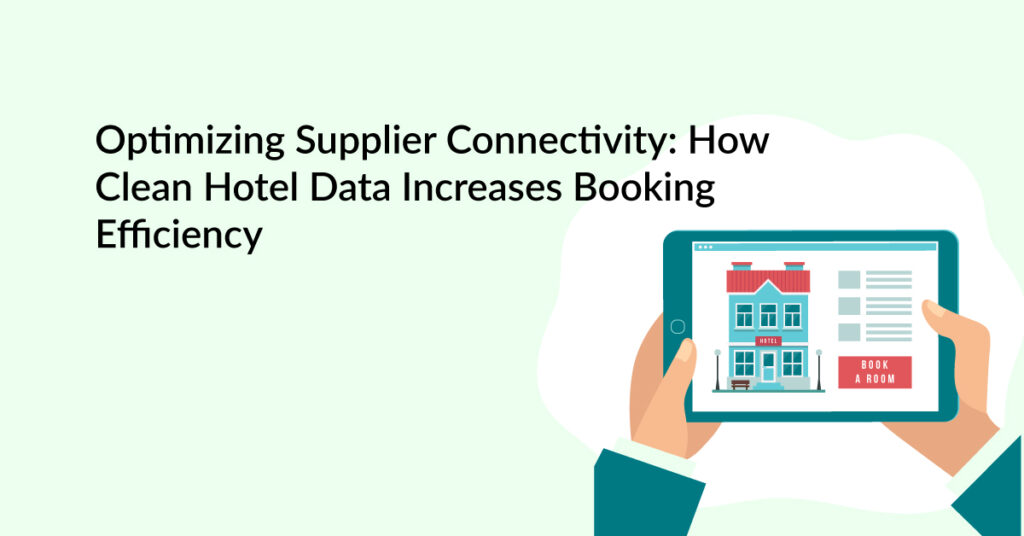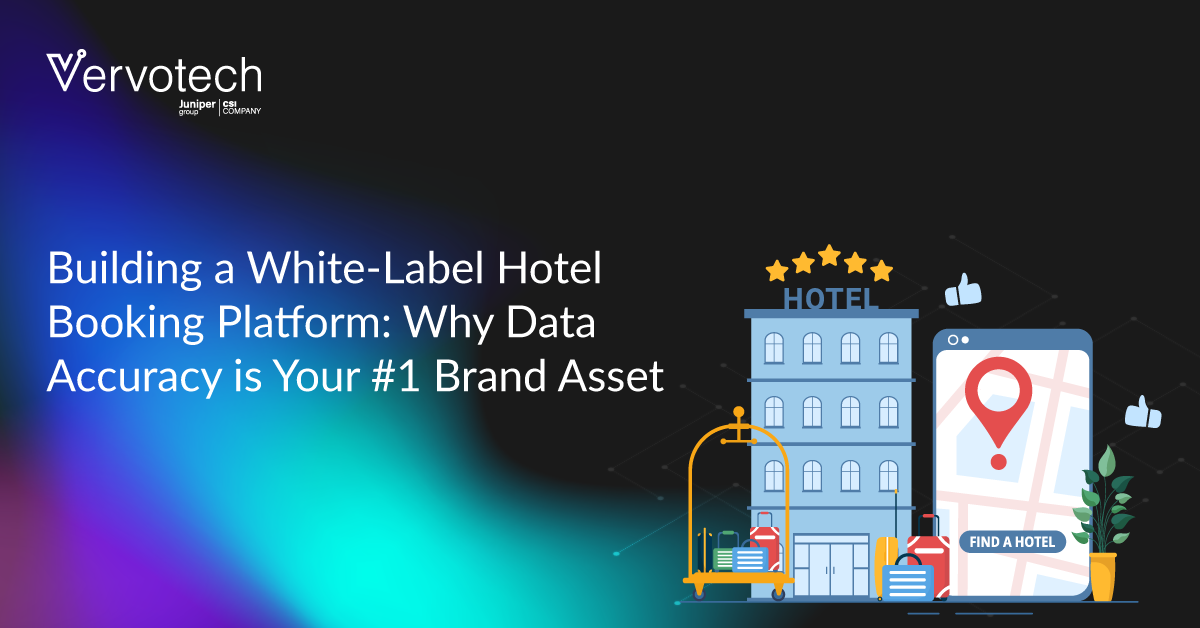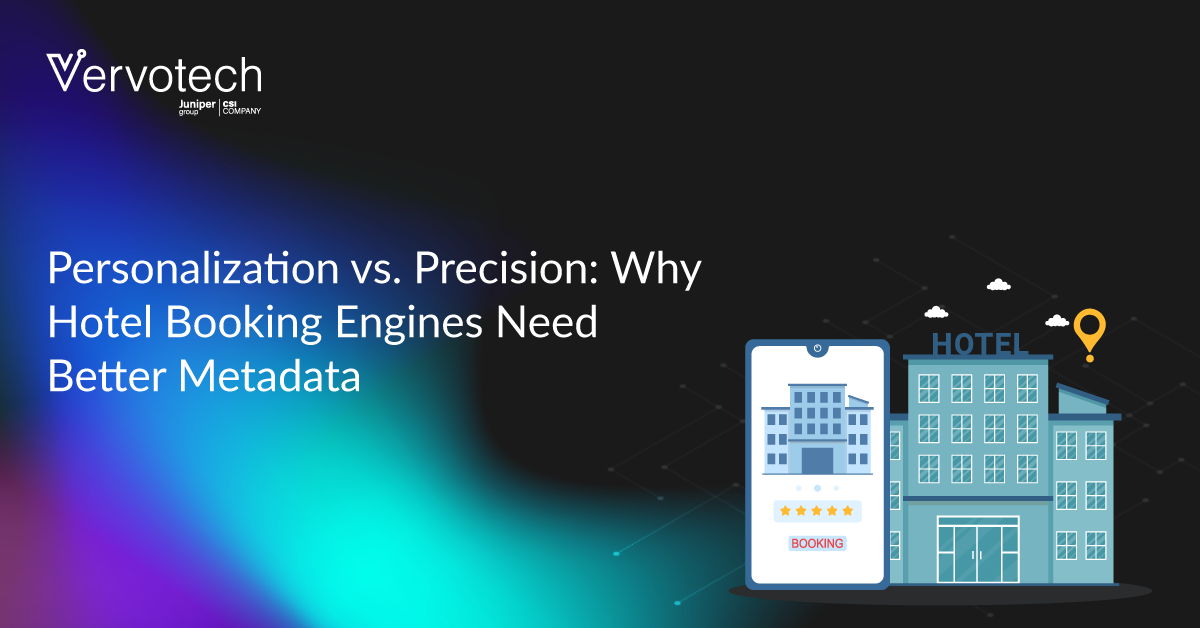The travel and hospitality industry thrives on seamless supplier connectivity. From online travel agencies (OTAs) and global distribution systems (GDSs) to direct hotel integrations, an efficient data exchange is essential for smooth operations. However, a major challenge that disrupts this ecosystem is unclean hotel data – inaccurate, inconsistent, or duplicate hotel records that create inefficiencies in search, booking, and inventory management.
Clean, or structured hotel data is the foundation of efficient booking processes, ensuring travelers receive accurate property details, real-time availability, and correct pricing. In contrast, poor data quality leads to increased customer complaints, failed transactions, and lost revenue opportunities.
To combat these issues, travel platforms must focus on data hygiene, ensuring clean, standardized, and synchronized hotel data across all systems. But how exactly does clean hotel data improve booking efficiency? We’ll explore in this blog.
TL; DR
- Clean hotel data is critical for seamless supplier connectivity across OTAs, GDSs, and direct API integrations.
- Unclean or duplicate hotel records lead to slower searches, pricing mismatches, overbookings, and lost revenue.
- Structured and standardized data enables faster search results and smoother booking flows.
- Accurate, real-time pricing and availability reduce cancellations, refunds, and customer support costs.
- Consistent property content (amenities, images, descriptions) improves user trust and conversion rates.
- Clean data ensures reliable API integrations, minimizing system failures and manual interventions.
- Poor data quality increases operational costs due to manual corrections and frequent customer disputes.
- Data deduplication, normalization, and real-time synchronization are essential to maintaining data hygiene.
- Automated hotel mapping and continuous data audits help prevent inconsistencies at scale.
- Case studies show that clean hotel data can drive faster go-to-market, higher bookings, and measurable revenue growth.
Understanding Supplier Connectivity in the Hotel Industry
What is Supplier Connectivity?
Supplier connectivity refers to the integration and data exchange between hotels and third-party platforms like OTAs, metasearch engines, GDSs, and travel management companies. This system allows real-time updates on:
- Room availability
- Pricing
- Property descriptions
- Photos & amenities
For travel companies and booking platforms, strong supplier connectivity ensures that customers access accurate and up-to-date information instantly. However, data inconsistencies and duplication hinder this process, leading to operational inefficiencies.
The Role of OTAs, GDSs, and Direct Integrations
There are three main ways hotels connect with distribution channels:
1. Global Distribution Systems (GDSs) – Platforms like Amadeus, Sabre, and Travelport aggregate hotel inventory for travel agents.
2. Online Travel Agencies (OTAs) – Platforms like Booking.com, Expedia, and Agoda list hotels directly, often pulling data from multiple sources.
3. Direct API Integrations – Hotels connect directly with booking engines via API, reducing dependency on intermediaries.
In each case, clean and structured data is vital for seamless operations. Inaccurate or redundant listings slow down the booking process, increase errors, and create a frustrating experience for both suppliers and travelers.
To see how clean hotel data can solve these issues, let’s examine its direct impact on booking efficiency.
Also Read – A quick guide to profit maximization for online travel business
The Impact of Clean Hotel Data on Booking Efficiency
When hotel data is inaccurate, outdated, or duplicated, the entire booking process suffers. Customers see incorrect room availability, mismatched prices, or misleading descriptions leading to lost revenue and damaged trust.
Clean data eliminates these challenges by ensuring accuracy, consistency, and real-time updates. This significantly enhances the speed and reliability of bookings. Let’s explore the key benefits.
1. Faster Search and Booking Processes
When travelers search for hotels, duplicate listings and incorrect metadata slow down search engines, creating a frustrating experience. Clean data:
- Reduces clutter, making searches faster.
- Ensures only relevant and accurate results appear.
- Improves search rankings and conversion rates.
2. Accurate Availability & Pricing
Pricing and availability discrepancies are common points. Nothing frustrates travelers more than selecting a hotel, only to find out the price has changed, or the room isn’t available. Clean data:
- Synchronizes pricing and availability across all platforms.
- Prevents overbookings and pricing mismatches.
- Reduces refunds, cancellations, and customer support queries.
3. Enhanced User Experience & Customer Trust
When hotel descriptions, amenities, and images vary across platforms, travelers lose confidence in the booking process. Clean data:
- Ensures uniform hotel descriptions, amenities, and images.
- Creates consistency across all booking channels.
- Increases customer satisfaction and return bookings.
4. Seamless API Integrations & System Interoperability
Poor data quality leads to API failures, broken integrations, and frequent system downtimes impacting supplier connectivity. Clean data:
- Enables smooth data exchange between hotels and booking platforms.
- Reduces manual intervention and error corrections.
- Improves booking efficiency and system reliability.
A seamless booking experience depends on accurate, well-structured, and standardized hotel data. However, poor data quality creates serious challenges that disrupt supplier connectivity. Now, let’s explore what happens when hotel data is unclean.
Challenges of Poor Data Quality in Supplier Connectivity
Inconsistent and low-quality hotel data leads to operational inefficiencies, poor customer experiences, and financial losses. If hotel information isn’t standardized, travelers face confusion, and hotels lose bookings.
Let’s examine the most common data challenges that impact supplier connectivity.
1. Duplicate Listings Leading to Confusion & Overbookings
Hotels listed multiple times under slightly different names cause search clutter and booking confusion. A traveler might book a room through one listing, while another duplicate entry still shows availability leading to double bookings.
2. Inconsistent Property Details
One source may list a hotel as having free Wi-Fi, while another shows it as a paid add-on causing guest dissatisfaction. Property images, star ratings, and descriptions may vary, leading to customer misinterpretations and increased cancellation rates.
3. Lack of Standardized Data Formats
Each hotel supplier may use different naming conventions and categorization formats. Without data normalization, platforms struggle to map data accurately, causing integration failures.
4. Increased Manual Work & Operational Costs
Travel platforms need constant manual data verification and correction, increasing labor costs. Customer service teams handle more disputes, refunds, and complaints, reducing overall efficiency.
Given these challenges, how can travel platforms ensure data hygiene?
Poor data quality is a significant obstacle to supplier connectivity, but hotels and travel platforms can implement strategies to maintain clean data and improve efficiency.
Strategies to Ensure Clean Hotel Data
Ensuring data integrity requires automation, standardization, and continuous monitoring. By implementing robust data management strategies, travel platforms can enhance supplier connectivity and optimize booking efficiency.
1. Data Deduplication & Standardization
- Use AI-powered tools to detect and merge duplicate hotel listings.
- Implement a unified data structure across suppliers to avoid discrepancies.
- Maintain a centralized hotel database that syncs across platforms.
2. Real-time Data Synchronization
- Ensure automated, real-time updates for pricing, availability, and amenities.
- Use cloud-based solutions to prevent outdated information from being displayed.
3. Automated Mapping Solutions
- Implement intelligent hotel mapping tools that align property details across multiple sources.
- Reduce the risk of inconsistent hotel IDs across different platforms.
4. Quality Assurance & Regular Audits
- Schedule frequent data audits to detect inaccuracies before they affect bookings.
- Use machine learning algorithms to identify anomalies in hotel listings and pricing.
- Work with data validation experts to ensure consistency across all listings.
Let’s look at a real-world example of how clean data transformed a travel platform’s efficiency.
Case Study: How a Leading Hotel Distribution Company Improved Booking Volumes & Revenue using Vervotech Hotel Mapping Solution
A leading hotel distribution company improved booking volumes & revenue using Vervotech’s Hotel Mapping solution.
These were the challenges they faced:
- Unorganized hotel data
- Inconsistent hotel listings
- Revenue loss
- Lack of visibility
Impact created by Vervotech’s Hotel Mapping API
- Improved client’s decision-making 10x faster
- 20-30% faster time to market than their competitors
- 30% increased bookings and 15% increase in revenue
- Delivered daily real-time content updates for up-to-date inventory
Key Takeaways
Clean hotel data is not just a technical necessity but a business advantage. Poor data leads to lost revenue, operational inefficiencies, and reduced customer trust. Implementing data standardization, real-time synchronization, and automated mapping ensures seamless supplier connectivity. Travel platforms must prioritize data quality to optimize bookings, enhance customer satisfaction, and improve supplier relationships.
Frequently Asked Questions (FAQs)
1. Why does hotel data quality impact booking conversion rates?
Inaccurate or inconsistent hotel data creates friction during the booking journey, leading to drop-offs when prices, availability, or property details don’t match expectations.
2. How does clean hotel data support scalability for OTAs and travel platforms?
Standardized and mapped hotel data allows platforms to onboard new suppliers faster, expand inventory, and enter new markets without increasing operational complexity.
3. Can clean hotel data improve relationships with hotel suppliers?
Yes. Reliable data exchange reduces disputes, overbookings, and reconciliation issues, creating stronger trust and smoother collaboration between platforms and suppliers.
4. What role does automation play in maintaining clean hotel data at scale?
Automation helps continuously detect duplicates, normalize formats, and sync updates in real time—tasks that are nearly impossible to manage manually at high volumes.
5. How quickly can travel platforms see results after improving data hygiene?
Improvements such as faster search performance, reduced booking failures, and better conversion rates can be observed within weeks, especially when automated mapping solutions are implemented.







